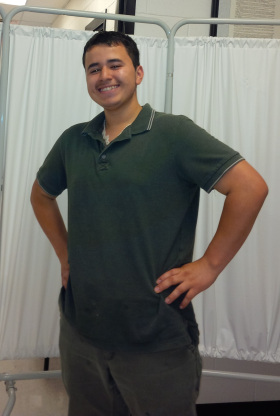Motivation is a powerful tool, and Eduardo knows how to channel it to make positive changes to his health and well-being.

Thanks to a successful BMI tracking effort by Northwood High School to identify students with higher-than-normal BMI and get them the help they needed, Eduardo’s health challenges started to come into focus. He was identified as being in the 99th percentile for BMI, and while there was no family history of heart disease or diabetes, Eduardo’s blood sugar was definitely in the diabetic range.
So Eduardo got to work, and with the help and support he received from the school-based health center staff at Northwood, he began taking part in an after-school nutrition program for students that would ultimately help him to turn his health around.
The classes were part of the Hallways to Health program, the latest in a partnership between Kaiser Permanente Thriving Schools and the School-Based Health Alliance. SBHA’s local affiliate – the Maryland Assembly on School Based Health Care – has rolled out Hallways to Health to a number of schools in the region, including Northwood High.
The program, now entering its second year, seeks to provide SBHC’s with the framework and skill-building practices that allow them to make improvements in how they administer care. Hallways to Health takes a holistic approach, aiming to address the needs of students as well as parents and teachers through a focus on obesity prevention, social and emotional health and employee wellness.
As part of Hallways to Health, Northwood enlisted Nutrition Educator, Elizabeth Saunders from the University of Maryland Extension’s Expanded Food and Nutrition Education Program to lead afternoon nutrition program for students. Through the four-week after-school program, Eduardo learned basic nutrition and healthy eating habits. He also received diabetic counseling, monitoring of his labs, as well as monitoring of his weight from Kay Sophar, the Nurse Practitioner at the school-based health center.
The program jumpstarted Eduardo’s road to weight loss and exercise. With the tools he was given and a bottom-less determination to make healthier life choices, Eduardo began to increase his daily physical activity and make a conscious effort to eat healthier. As a result he began to see changes in his weight and energy levels, shedding 40 pounds, decreasing his BMI by 6 points and getting his blood sugar back to a normal level.
Saunders said that students like Eduardo really showed engagement in what they were learning in the after-school classes.
“The classes at Northwood High school were very enriching, says Saunders. “Students showed interest in the classes and they came to the classes ready to make lifestyle adjustments. Students came to the class each week with reports of what they are doing to make their diets healthy and to be physically active.”
Thanks to his success in weight loss and healthy living, Eduardo has now taken it upon himself to spread the message among his peers on a national level. He began conducting service hours with the Center for Science in the Public Interest to assist in helping them create healthy El Salvadorean recipes. He is working with Kate Sherwood, the culinary director and executive chef of the CSPI in Washington D.C., as she writes The Healthy Cook recipe page for CSPI’s newsletter. CSPI hopes to create cookbooks of healthy ethnic recipes in the near future, starting with Eduardo’s contributions.
Special thanks to Sapna K. Hencinski, MPH and the folks at the Maryland Assembly on School-Based Health Care (MASBHC) for contributing this post.
- Learn more about the work of MASBHC on their website or on twitter @MASBHC
- Visit School-Based Health Alliance‘s website and twitter handle, @sbh4all, to learn more about their support for school-based health care.
- Visit the Center for Science in the Public Interest‘s website and twitter handle, @CSPI.




